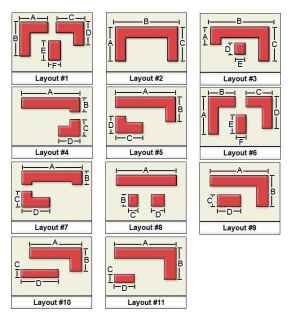Granite vs Laminate
Sure, laminate kitchen countertops come in a huge array of colors and styles, but these days, laminate countertops just leave a kitchen looking dated. Laminate countertops especially drag down a kitchen’s look when the appliances have already been updated.
Advantages of Granite Countertops:
- Granite countertops are much sturdier, in general, than laminate countertops. For one thing, granite is less likely to be damaged by heat than laminate. While laminate counters can burn, this is not a concern with granite countertops. Granite cannot rip like laminate does. Sharp knives can easily leave score marks in a laminate countertop, but with granite, this is much less of a concern.
Besides its durability, one of the biggest advantages of installing granite countertops in your kitchen is that it adds value to your home. An experienced company is able to cut the countertop pieces to perfectly match each kitchen’s dimensions. While granite is heavy to install, once it’s installed, it will remain beautiful and functional for years.
- Granite countertops come in a wide variety of colors and hues that fit any kitchen’s decor. The color of granite will differ depending upon where the stone was mined. Location of mining also determines the pattern of the stone – solid, speckled or a mix of patterns. Granite options range from light solids to dark color mixes. Because every slab is unique, installing granite countertops gives homeowners an opportunity to make a statement that’s all their own.
Laminate Countertop Prices vs Granite Countertop Prices
- Laminate kitchen countertops are made from a combination of synthetic materials so prices remain fairly stable. For granite countertops, on the other hand, prices vary depending upon installation requirements and mine location.
- Laminate countertops are generally priced by linear square footage. Prices can range from $5.00 per linear square foot to $100.00 per linear square foot. Edging must also be figured in to the price.
- Granite kitchen countertops require more initial cost, but the return on the investment is excellent. The prices range from $30-50 per square foot installed. But, these days, homebuyers are often looking specifically for granite countertops because they believe it provides additional value to a home.
- Granite countertops are quarried directly from the earth as a single chunk. These counters are all natural stone that have been taken out as large blocks that can be later cut into individual slabs.
- Quartz countertops contain crushed quartz mixed with resin in a ratio of 93% quartz to 7% resin.
They are manufactured in a variety of different patterns and colors.
Granite vs Quartz
- Quartz countertops are just as strong as granite but have the added benefit of being more flexible. This makes them easier to work with during the installation process.
- Quartz is non-porous and does not require any sealing – ever. These stones offer a virtually no-maintenance material solution for countertops.
- These counters are also very durable but they cannot be considered indestructible either. They are stain-resistant as well so dropping a glass of wine on them simply requires a quick cleanup.
- One drawback that you should definitely take note of is these counters can discolor over time when exposed to direct sunlight. If you have a part of your counter that receives some of the UV rays from the sun while another part doesn’t, over time you may see a color difference
- You can expect to see seams with a quartz counter but they will be less visible if you choose a slab that’s darker in color. As well, the seams are easier to hide when you choose quartz because the counter has been colored and manufactured. If you buy a quartz countertop in a solid color, it’s much easier to hide the seam to a certain extent.
The benefits and drawbacks of granite:
Here are some of the most important drawbacks and benefits of granite that you need to know:
- The appearance is not uniform. These stones are coming right out of the earth and are not perfectly designed by nature. For some this will be a benefit while others will consider it to be a drawback.
- Granite countertops will need to be sealed before they are used and this will need to be repeated for as long as you own the countertop. Granite is a porous stone and can only be considered to be stain-resistant if it has been sealed properly.
- Countertops made of granite are extremely durable but should not be considered to be indestructible. It is a natural rock and can break or chip if subjected to heavy abuse. For regular day-to-day activities though, and with proper maintenance, this is a countertop that can last for a lifetime and beyond.
- The samples that you see can slightly differ from the stone that you receive. Keep in mind that these are naturally occurring slabs so the samples cannot be a true 100% reflection of the stone you are ordering. There may be color variances or occlusions in the stone you receive that gives the slab a slightly different appearance.
It’s all about you – the reviews can get very confusing!
If you spend some time browsing through the internet you’ll find a range of different reviews about quartz vs granite. While one homeowner will tell you that you absolutely, positively must get a quartz countertop, another reviewer will insist upon buying granite counters. When you do spend some time reading through these reviews, however, you will notice one point that stands out.
Both quartz and granite countertop owners are defending their own personal choices with a vengeance because they are so completely pleased with their counters. At the end of the day, you can walk away from these reviews knowing that choosing either quartz or granite stones will provide you with a countertop that you’ll love!

